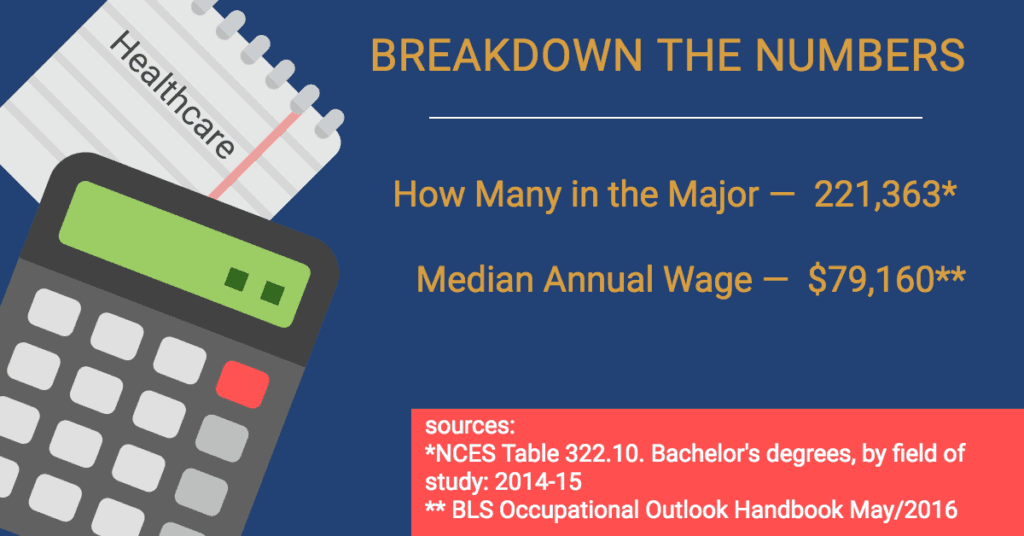
If you want the security of knowing you can get a job anytime, anywhere, at practically a moment’s notice, there’s pretty much only one field that can deliver: Nursing and Healthcare. The Healthcare Industry is the third fastest-growing sector in the US, after technology and construction, and according to the Bureau of Labor Statistics, jobs in healthcare are growing by 19% – way faster than average.
Check out our Rankings of Online Nursing Degrees:
- 25 Best Online RN to BSN Nursing Programs
- 25 Best Online MSN Nursing Programs
- 25 Best Online DNP Nursing Programs
Whether you’re already working in the profession, or looking to change or start a career, Healthcare and Nursing is among the most promising avenues. There are hospitals, doctors, and clinics in every metropolis, city, small town and suburb that need nurses, administrators, and technicians, and the job market is far from saturated – in fact, there are not nearly as many qualified candidates as there are open positions.
The College Consensus has gathered all available information about the higher education system and the job market for prospective students in every field – a massive storehouse of dynamic data to help give you the big picture. This guide is your entrance into the Nursing & Healthcare field, designed to help you make the decision that will change your life. For help in financing your education, be sure to check out our Top 25 Scholarships for Nursing School students.
Recommended Online Nursing Degree Programs
Visit sites to learn more about enrollment, tuition, and aid
What Are the In-Demand Major Options?
There are a lot of major options in nursing and healthcare, including many specializations, technician, and administrative programs. Obviously, the first order is nursing itself. Most colleges and universities have nursing majors, particularly programs to help registered nurses earn a Bachelor of Science in Nursing or a Master of Science in Nursing (commonly called RN to BSN or MSN programs).
But there is a huge range of specializations available, particularly at the MSN level:
- Nurse Midwifery
- Nurse Practitioner
- Nurse Anesthetist
- Psychiatric Nurse
- Neonatal, Pediatric, Geriatric Nursing
Some of these, like NP, Nurse Anesthetist, and Nurse Midwifery, are highly specialized and pay very well in addition to setting nurses up for more responsibility and authority, as well as promotion.
But the healthcare system also needs people to keep the offices running smoothly so the nurses and doctors can do what they do best, and those areas are growing just as quickly – in some cases, even quicker. Colleges and universities are more often offering specializations in areas like:
- Healthcare Administration
- Healthcare Informatics
- Nurse Research
- Health Science
Healthcare Informatics is especially on the rise in the era of Big Data – medical records are incredibly complicated, and so is keeping up with statistical data. Expect to see more Informatics programs pop up in the future as the job market struggles to keep up with the demand.
Of course, healthcare needs technicians as well, so for those who want to get in on the market without having to deal with fluids or germs, there are many specialized programs, some at just the associate’s level to get into a new career right away:
- Radiologist
- MRI
- Nuclear Medicine Technology
- Respiratory Therapy
Are There Any Online Options for Studying Nursing & Healthcare?
Nursing can be tricky online, because of the exceptionally hands-on nature of the profession. While there are some free online nursing courses available, there are virtually no basic nursing degree programs online to prepare for the RN – you have to get at least an associate’s degree from a real-world community college, college, or university to qualify for licensure as an RN.
But from there, many online RN to BSN and MSN options are out there from accredited colleges and universities of every type, from large public research universities to small liberal arts colleges and tech schools. Most of these require clinicals, but since you already have the hands-on education, you can usually fulfill clinical requirements in whatever job you already have as an RN.
Some higher-order specializations, like Nurse Midwifery or Nurse Anesthesia, may not be available online, however, because of the extremely intensive nature of the specialization.
Administrative and technician majors are often available online as well, since careers like Healthcare Informatics or Healthcare Administration are largely done on computers anyway. Many Associate’s of Science programs in areas like Radiology and MRI Technician are available fully online as well.
Recommended Online Nursing Degree Programs
Visit sites to learn more about enrollment, tuition, and aid
Are There Complimentary Majors or Fields to Nursing & Healthcare?
Honestly, you very well many not have time for a double major or minor if you’re getting a degree in nursing, especially if you’re a working professional earning a second degree. But if you can fit in the time for some extra elective hours, there are some good compliments that can not only make you a better nurse, but help you stand out for promotion or on the job market:
- English/Writing/Communication
- Foreign Language
- Psychology/Counseling
- Business
Nurses often don’t realize how much writing and reporting is involved in the job until they’re already working, but because nurses have so much record-keeping to do, a minor (or at least some courses) in a discipline like English, Writing, or Communications can make a big difference. A nurse who writes well not only proves their expertise, but can keep patients safer.
It’s also a good idea to have some fluency in a foreign language, especially Spanish, but even other languages can be helpful; everyone needs medical care, and a patient who does not speak English will be much more at ease if someone speaks their language.
To help patients in distress, a good working knowledge of psychology and counseling techniques can make the difference between good care and disaster. Getting a minor in psychology isn’t just for nurses working in the psychiatric ward; it helps everyone around them.
Business is a smart plan as well for ambitious nurses, or for healthcare administrators. Healthcare is one of the most ripe fields for entrepreneurship, and working nurses with a strong business sense will find themselves set for success when an opportunity comes along.
Advanced or Alternative Degree Options?
While there are many employment options and careers available for RNs with an associate’s or bachelor’s degree, many nurses are finding that the ceiling is pretty low for pay and promotion. That, and a significant shortage of qualified nurses, are the primary reasons so many online MSN programs have been developed in the path decade.
Specialized roles almost always require an MSN, so for nurses who want to work in the higher-paying, higher-responsibility positions like Anesthesia or Nurse Practitioner, there is no choice. The same goes for nurses in managerial positions; to qualify, you need a master’s. Fortunately, many working nurses can get support from their employer to go back to school and earn an advanced degree.
Doctoral degrees for nurses are also plentiful, primarily for nurses who want to teach at the college level, or enter research or administrative roles. The Doctor of Nursing Practice is a specialized practical degree for nurses who want to practice nursing at a higher level; the PhD in Nursing is primarily for those who want to do research or teach. Both are commonly available in online formats as well.
What Kind of Career Might I Pursue?
Nurses, whether RN, LPN, NP, or any specialization, can find employment in a wide variety of settings, from local clinics and doctor’s offices to regional hospitals, major research and teaching hospitals, and everywhere in between. Pay rates vary according to education level and specialization, but Nurse Anesthetists can make as much as $104,000 at the higher end, according to the BLS, while at the lower end RNs can make an average of $68,000 – still more than respectable.
Professionals with training in Healthcare Administration and Healthcare Informatics, as well as nurses with research training, have an even wider net; besides jobs in hospitals and clinics, they can pursue career options in government agencies (such as the CDC or NWO), colleges and universities, and private corporate settings like the pharmaceutical industry.
Recommended Online Nursing Degree Programs
Visit sites to learn more about enrollment, tuition, and aid
Required Skills or Personality Type?
The particular skills required for nursing and healthcare often depends on the specialization, but there are some particular skill sets that cross over, including nursing and administration:
- Organization
- Communication Skills
- Attention to Detail
- Analytical Thinking
Nursing, in particular, is an extremely demanding job, with long hours and highly stressful settings. Nurses experience emotional and even traumatizing situations daily, and must have strong nerves and coping mechanisms. A good nurse needs:
- Patience
- Empathy
- Calm in Emergencies
- Emotional Intelligence
When we say “good bedside manner,” this is what we mean – a nurse who makes patients feel they are protected, cared-for, and safe. Not everyone can do it, and that makes those who can all the more valuable.

